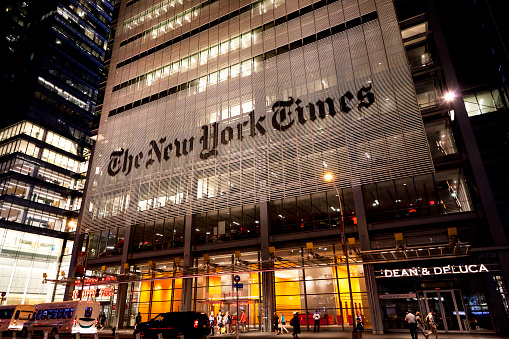A five-word headline that scarcely made the light of day has put the New York Times on the defensive from many Democrats. It’s a striking turn of events for a newspaper that normally enjoys wide approval on the left-of-center political front.
Over a lead article on President Trump’s speech Monday about the mass shootings in El Paso TX and Dayton OH, the headline read “Trump Urges Unity vs. Racism.” It appeared only once on the front page of the Times’s Tuesday print edition before it was pulled.
The newspaper’s Executive Editor, Dean Baquet, called it a “bad headline” and conceded Tuesday that it failed to capture the spirit of the article that followed, which was characterized by the Daily Beast as “an appropriately skeptical story” about the president’s televised address.
“It was written on deadline and when it was passed along for approval we all saw it was a bad headline and changed it pretty quickly,” Baquet told Daily Beast in a Tuesday morning text.
But the replacement headline — “Assailing Hate, But Not Guns” — came too late for many liberals, reports Politico’s senior media writer, Jack Shafer. They pounced.
Rep. Alexandria Ocasio-Cortez (D-NY) tweeted that the headline serves “as a reminder of how white supremacy is aided by—and often relies upon—the cowardice of mainstream institutions.”
“Unbelievable,” tweeted presidential candidate and former Texas Rep. Beto O’Rourke. Another candidate, Rep Cory Booker (D-NJ), tweeted: “Lives literally depend on you doing better, NYT.”
Joan Walsh, columnist for The Nation and a CNN contributor, announced on Twitter that she was cancelling her Times subscription.She later added that “A lot of people love the paper but are deeply disappointed in much of its political coverage for the last four years.”
All this, and much more — Shafer says that at the time of his writing the hashtag #CancelNYT had appeared in 16,000 tweets — raises big questions for the news media.
“For the first time in my career, making the press a foil is good politics in a Democratic primary, and that is going to have long-standing consequences for the business of journalism,” said Dan Pfeiffer, a former Obama adviser who now co-hosts a political podcast.
“The fury uncaged by the … headline had less to do with the language used and more to do with the political validation that liberals and lefties have come to demand from the news media they consume,” Shafer writes. “It’s not good enough for some liberals that the Times has kept a tight vigil on Trump…. They want every column-inch of copy in the Times to reinforce and amplify their resistance values, right down to the headlines.”
To Shafer, “there’s something unhinged about isolating a headline, even an infelicitous one, to urge people to end their subscriptions and demand the sacking of an editor.”
“The easy lesson of the great … headline dust-up is that you should never judge a story by its headline,” he concludes. “But when you do, just remember to read the story before you start attacking people on Twitter.”
Shafer’s words echoed the Time’s Baquet, who texted: “I understand the concern people have. Headlines matter. But I hope they read the coverage, which I will argue was strong.”
